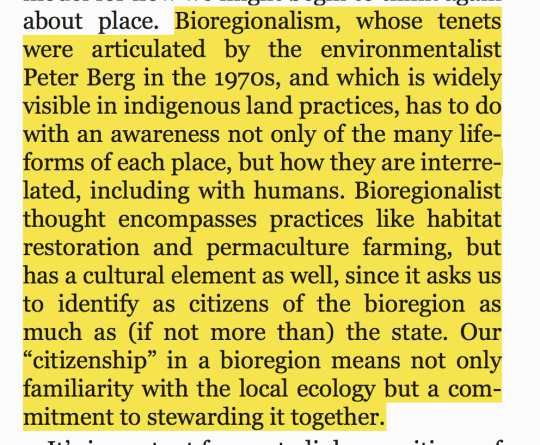Link
2 notes
·
View notes
Link
"For me, this process of exclusion only really became clear when I researched more into other cultures (including Indigenous animists) where plants are related to as proper persons (with all the respect that deserves) as well as being resources. This view of plants stems largely from a sense of kinship – a pre-Darwinian appreciation of common ancestry, with all creatures recognised as coming from, and returning to, the Earth. It also arises from the practical fact that (as anyone who works closely with plants sees) plants obviously actively live their lives. They grow in incredible places, they sense and communicate, they are pretty self-sufficient, they live and flourish, reproduce and die – a view that is corroborated by much recent evidence in the plant sciences.“
2 notes
·
View notes
Link
“Homo sapiens appeared around 200,000 to 300,000 years ago, when forests had already existed for millions of years. Over time, trees evolved to fit their environment, adapting to constantly changing climatic conditions, invasive neighbours, diseases and opportunistic pests. Deprived of the ability to move, these vegetal beings had to develop a different kind of creativity to survive, including communication and cooperation through the sharing of vital information.”
“Science can, however, serve intuition. Ancient, traditional, shamanic and indigenous views are increasingly being recognised by the modern Western scientific world. In 2017, at the University of Western Australia, Dr Monica Gagliano conducted a study proving that plants are aware of their surroundings and have much more complex and developed senses than we think.”
1 note
·
View note
Link
“The zoo cannot but disappoint. The public purpose of zoos is to offer visitors the opportunity of looking at animals. Yet nowhere in a zoo can a stranger encounter the look of an animal. At the most, the animal’s gaze flickers and passes on. They look sideways. They look blindly beyond. They scan mechanically. They have been immunized to encounter, because nothing can any more occupy a central place in their attention. Therein lies the ultimate consequence of their marginalization… This historic loss, to which zoos are a monument, is now irredeemable for the culture of capitalism.“
1 note
·
View note
Link
"Al contrario de lo que se sobreentiende al simplificar la perspectiva evolucionista, la estrategia victoriosa no es ser el más fuerte o agresivo, sino también ser el que más cuida sus amistades.”
0 notes
Video
youtube
¿Somos responsables de un mundo en crisis? | Jorge Riechmann y Helen Torres
0 notes
Video
youtube
Inspired in the book "The Cosmic Serpent: DNA and the Origins of Knowledge" by Jeremy Narby
2 notes
·
View notes
Link
0 notes
Link
La búsqueda de soluciones alternativas ha conducido a la fitorremediación, una tecnología verde que explota la capacidad de algunas plantas (y sus microorganismos asociados) para degradar contaminantes orgánicos, entre otras aplicaciones.
El proceso funciona con energía solar, respeta el entorno y es barato. Algunas especies arbóreas, sobre todo los chopos o álamos (género Populus), son especialmente adecuadas para descontaminar, como analiza esta revisión reciente que hemos realizado en el Centro de Biotecnología y Genómica de Plantas de la Universidad Politécnica de Madrid (CBGP UPM-INIA).
0 notes
Link
Esa línea, escéptica e irónica con la propia episteme, en la médula de la propuesta de Latour, que se atreve a reeditar otra hipótesis, formulada en New Jersey en 1969. El planeta azul se comporta como un organismo viviente. Lovelock concibió su hipótesis Gaia estudiando la atmósfera de Marte. Quien no conoce una lengua extranjera no conoce la suya propia. La atmósfera terrestre como extensión dinámica de la biosfera. El conjunto de todos los seres vivos como envoltura viva del planeta. Un gran organismo capaz de controlar su propia evolución mediante la homeostasis (la autorregulación de su composición y estructura), que ha aprendido, mediante la prueba y el error, a adaptar el entono (como hace cualquier ser vivo) a sus necesidades. La hipótesis es loca y hermosa.
(...)
Siempre hay una deidad emboscada que exige que no se la compare con ninguna otra, nos dice Latour. Esa deidad se llama hoy Ciencia, así, en mayúscula
(...)
La naturaleza no es un objeto. De hecho, la gramática sujeto-objeto es inadecuada para acerarnos a lo natural. “Si ciencia significa conocimiento objetivo, entonces no puede haber una ciencia de la naturaleza”.
0 notes
Video
youtube
Lanzamiento de "Proyecto Araucaria: mi viaje para descubrir lo sagrado" de Fiorella Angelini
0 notes
Link
0 notes
Link
Toward an Interspecies Democracy
“Drawing on insights from science, philosophy, and politics, Meijer provides fascinating, real-world examples of animal communities who use their voices to speak, and act, in political ways. When Animals Speak encourages us to rethink our relations with other animals, showing that their voices should be taken into account as the starting point for a new interspecies democracy.“
#Eva Meijer#when animals speak#book#interspecies relationships#Toward an Interspecies Democracy#animals
0 notes
